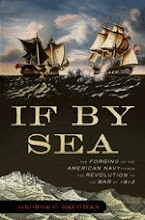AWARDS
"If By Sea" received the Samuel Eliot Morison Award from the New York Commandery of the Naval Order of the U.S. in New York City on November 3, 2008. The award is given every year to an "American author, who by his published writings shall have made a substantial contribution to the preservation of the history and traditions of the US Navy".
"If By Sea" has received an Honorable Mention for the prestigious 2009 Fraunces Tavern Museum Book Award. "The award is presented each year to the author of the best, newly published work on the American Revolutionary period, combining original scholarship, insight and good writing,......." The committee is also empowered to name additonal awards such as Honorable Mentions..... whenever they deem appropriate".
"If By Sea" has received an Honorable Mention for the prestigious 2009 Fraunces Tavern Museum Book Award. "The award is presented each year to the author of the best, newly published work on the American Revolutionary period, combining original scholarship, insight and good writing,......." The committee is also empowered to name additonal awards such as Honorable Mentions..... whenever they deem appropriate".
Best Seller Lists
#5 on the best seller list for the San Francisco Chronicle.
#8 on the best seller list for the Maine Sunday Telegram.
#8 on the best seller list for the Maine Sunday Telegram.
Review
"This is a book for those who like their history braced by serious thinking - and spiced by action. Goerge Daughan makes us realize just how complicated it was for Americans to acquire a navy - and keep one - for the first three decades of our national existence. Simultaneously he grips us with vivid narratives of what these mostly forgotten sailors accomlished."
Thomas Fleming, author of The Perils of Peace: America's Struggle to Survive after Yorktown.
Thomas Fleming, author of The Perils of Peace: America's Struggle to Survive after Yorktown.
Review
"If By Sea" illuminates the tangles and contested origins of American naval power better than any other book in recent memory. Daughan has a sharp eye for detail as well as a firm grasp of the big picture. His writing combines passionate conviction with a deep knowledge of seamanship in a way reminiscent of Samuel Eliot Morison. This is a book I will read again."
Edwin G Burrows, co-author of Gotham
Edwin G Burrows, co-author of Gotham
Review
"If By Sea by George C. Daughan covers the Navy's first forty years with authority, clarity and detail. He puts the famous names - John Paul Jones, Oliver Hazard Perry - in context, while bringing others - including dozens of Revolutionary War figures, hitherto unknown to me - to light. He shows how the military, like any other large organization, lurches and learns over time, from blunders, missed opportunities and general snafu, until those moments when the right men are at headquarters and in the field, and everything gloriously clicks."
Richard Brookhiser, author of George Washington on Leadership and What Would the Founders Do?
Richard Brookhiser, author of George Washington on Leadership and What Would the Founders Do?
More Reviews
Reviews are added below as they come in. In order not to be too repetitive many of the reviews are condensed.
Kirkus Reviews
"Ambitious, painstakingly detailed account of how the fledgling American fleet grew into a permanent navy. Despite calls by George Washington and John Adams to raise a navel power, there was no muscular attempt to organize patriot sea militias at the outbreak of the Revolution, largely because the Royal Navy appeared so dominant. The rebels didn't realize, writes Daughan, former director of the Air Force Academy's MA program in international affairs, that their strength lay in their humble whaleboats. This is evident in the author's blow-by-blow re-creation of such early sea skirmishes as the overtaking of the British Margaretta by rebels off the coast of Machias, Maine, on May 24, 1775, a battle that James Fenimore Cooper later called "the Lexington of the sea." The Continental Congress could not adequately direct naval strategy, while the heroic efforts of patriot seamen like John Paul Jones, John Barry, Lambert Wickes and Nicholas Biddle were squandered on insignificant missions.The French alliance helped turn the tide, but what remained of the Continental Navy played little part in the momentous victories, and the new republic was too broke to fund a navy. Goaded by high-seas piracy and impressments and seizure by the English, Congress eventually passed the Naval Act of 1794, which authorized the construction of a half-dozen frigates-"a pathetically smallforce," notes Daughan. President Adams was determined to bolster defense measures, but his successor was unwilling to expend public funds for defense; Jefferson preferred to use the power of commerce as a foreign-relations weapon. The issues of impressment and trade grew increasingly contentious between America and Britain, culminating in the declaration of war by President Madison in 1812. The author demonstrates how American privateers effected some surprising victories, contributing to the growing consensus that the navy was indeed critical to the nation's defense. Not just a rigorous, steady-going chronological history, but also a cogent analysis of the genesis of a defense strategy."


